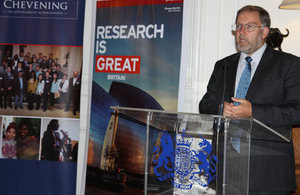Celebrating UK-Chile knowledge exchange
Chevening Scholars and Newton-Picarte Fund stakeholders attended a reception for Foreign Office Chief Scientific Advisor Prof. Robin Grimes.

FCO Chief Scientific Advisor Robin Grimes addresses the invitees at the British Residence in Santiago.
On Tuesday 25 August, the British Embassy Santiago hosted a reception on the occasion of the visit to Chile of Professor Robin Grimes, Chief Scientific Advisor of the Foreign and Commonwealth Office. The event highlighted UK-Chile knowledge exchange initiatives by recognising the Chevening Scholarships scheme along with the science, innovation and educational achievements established through the Newton-Picarte Fund. Over sixty guests attended – including new Chile Chevening Scholars, Chevening alumni and science and innovation stakeholders.
Professor Grimes emphasised how the Newton-Picarte Fund is creating “new bilateral collaboration links between both the UK and Chile” with the aim of serving as a “springboard for longer-term sustainable partnerships and knowledge exchange”.
He also commented on the UK’s commitment to furthering global knowledge exchange through the increase in Chevening Scholarships in Chile. He encouraged Chile Chevening Alumni to continue to participate in the global Chevening Community and strive towards building “a mentoring network for the new generations of future leaders.”
Her Majesty’s Ambassador Fiona Clouder also expressed the shared commitment to strengthen UK-Chile bonds through knowledge exchange:
The Newton-Picarte Fund, which offers up to £4,000,000 per year over a period of 3 years, has created new and long-lasting partnerships between UK and Chile public funding institutions. Together these institutions have co-funded 49 projects in Chile’s development priority areas.
One of the co-funded projects involved a joint research project between the University of Birmingham and the University of Chile that investigated the impacts on pregnancy of wood-burning pollution in Temuco. Another project between the University of Edinburgh´s Roslin Institute and the University of Chile conducted genetic research on improving the resistance of Chilean salmon fish against the biggest bacterial threat to one of Chile’s largest industries - Salmon Rickettsial Syndrome.
Along with Newton-Picarte Fund project achievements, the UK government funded Chevening scholarships are another area where we are continuing to increase Chile-UK knowledge exchange.
Tonight’s reception is also an opportunity to officially congratulate twenty-five new Chevening Scholars. We are excited to award this record number of scholarships thanks to the UK government tripling the amount of funding in 2015-2016 for Chevening scholarships. These twenty-five future leaders will soon travel to the UK to pursue master’s programmes at 10 leading UK universities in a diverse range of topic areas including Molecular Genetics and Diagnostics, Environmental and Energy Engineering, Social Policy and Development and Leadership in Education.
A number of Chile Chevening Alumni are also here to welcome this group into to the Chevening community. Within our network of over 200 Chile Chevening Alumni there are many great examples of how these leaders continue to build life-long UK-Chile links in a variety of fields after the completion of their studies.
I invite the Chevening Scholars and the Newton-Picarte Fund stakeholders here today to meet one another and exchange your professional achievements in areas such as science, innovation and education. By sharing our experiences, we can continue to build upon the wonderful UK-Chile knowledge exchange networks we collectively have established.
Further Information
Applications for the 2016/2017 Chevening Scholarships programme are now open in Chile. Please visit www.chevening.org/chile to learn more about Chevening Scholarships in Chile.
Learn more about the Newton Fund by visiting this website.